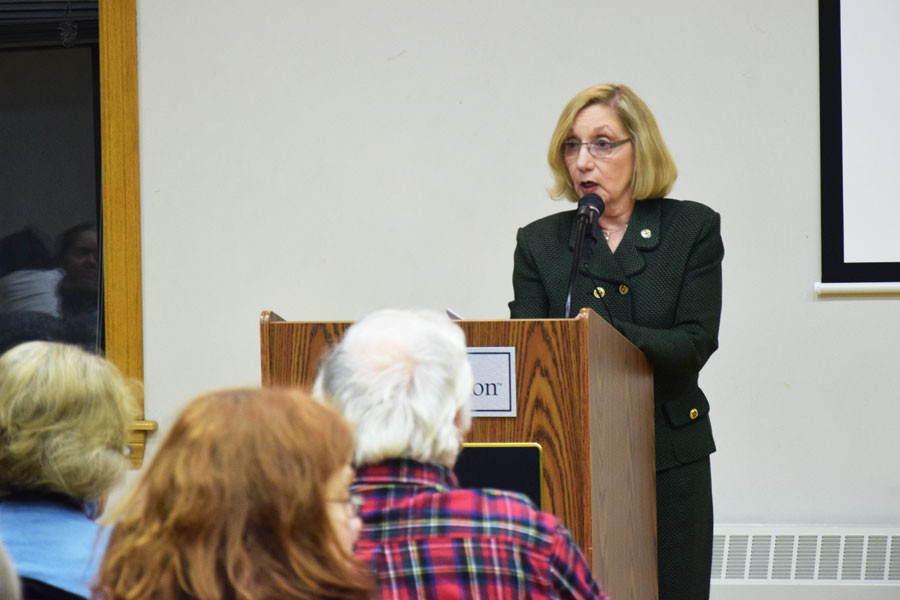Community members express grievances over state budget impasse
Courtney Morrison/The Daily Northwestern
Both candidates for Illinois’ House of Representatives District 18 agree that Illinois should consider banning automatic assault rifles to keep communities safe from gun violence.
November 10, 2015
Illinois Budget Crisis
Evanston residents and community activists shared personal difficulties amid the state budget impasse — from the overcrowding of health service centers to withholding of funds for homelessness outreach programs — at a town hall meeting Monday night.
About 80 Evanston residents and local nonprofit leaders gathered at the Civic Center, 2100 Ridge Ave., to vent frustrations and tell stories regarding the state budget impasse that has been ongoing since July 1, when state legislators failed to reach an agreement on the state budget before the beginning of the new fiscal year. The town hall meeting was organized by state Rep. Robyn Gabel (D-Evanston).
Gabel said the Illinois budget has remained in limbo because Gov. Bruce Rauner has shifted his focus from solving the budget crisis to addressing other legislation.
“Both liberal think tanks… and also conservative think tanks… have come up with pretty much the same solution to the budget,” Gabel said at the meeting. “If we could just sit down and actually work on the budget itself, this could be resolved in a short period of time.”
The meeting featured testimony from Evanston residents and community workers who addressed issues of homelessness, education, mental health services and child care — areas that have seen their funding partially frozen due to the impasse.
Evanston resident Beatriz Cabrera spoke of how she had to quit her job to take care of her infant daughter because she could not afford child care with her current salary.
“I would love to go back to work, but I can’t afford childcare,” said Cabrera, who made $360 per week in her job. “Please help me and change the rules so I can get back on my feet.”
A silver lining for families in Cabrera’s situation came in an announcement from Rauner’s office Monday morning that set forth a partial solution to the effects of narrowed eligibility for the Child Care Assistance Program. Following “bipartisan discussions,” Rauner’s administration implemented an increase in the income eligibility for child care assistance.
“As a result of bipartisan discussions with legislators concerning the future of the Child Care Assistance Program… income eligibility will rise to 162 percent of the federal poverty level while current co-pays will remain intact,” Rauner’s office said in a news release.
Still, several Evanston social services institutions — such as Connections for the Homeless and Family Focus — have been forced to cut back on vital programming and fire long-standing employees. Sue Loellbach, acting executive director for Connections, said their homeless prevention program, which helps people on the brink of eviction pay their outstanding rent, was one such sacrifice.
“(This program) is the single most effective program we have,” Loellbach said. “Without that assistance people get evicted and become homeless. With an eviction they can’t get another apartment, and that starts a cycle that affects them for the rest of their lives.”
Other institutions have had to reallocate funds and rely on donations to compensate for the impasse. Oakton Community College has looked to its educational foundation and institutional reserves to provide funding for their Monetary Award Program grants and other financial aid services, Oakton spokesman Paul Palian told The Daily in an email.
Susan Resko, president of the mental health facility Josselyn Center in Northfield, said the budget indecision has put lives at risk by making it difficult for mentally ill people to get the treatment they need.
“This is a public health and safety crisis,” Resko said.
Correction: A previous version of this article misrepresented how Oakton Community College is being impacted by the state budget crisis. OCC has had to find alternative funding sources to pay for some of its programming. The Daily regrets the error.
Email: [email protected]
Twitter: @marissahpage


